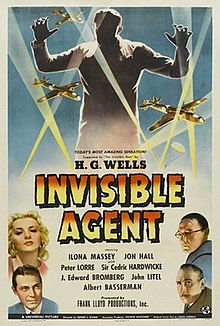Invisible Agent (1942)
- Andrew Smith

- Apr 15, 2022
- 4 min read
"Today's most amazing sensation"

Plot
Frank Raymond, grandson of the original Invisible Man, still has the invisibility formula but considers it too dangerous to use and has tried to start a new life under an alias name. When German agents try to get it by force, the Allies approach him to work for them but he refuses. However, the bombing of Pearl Harbour compels him to volunteer his own services to spy on the Germans, using the formula to render him invisible.
It’s sad to see that Universal’s The Invisible Man series is nowhere near as fondly remembered as their Frankenstein, Dracula or even The Wolf Man films. 1933’s The Invisible Man is one of science fiction’s greatest ever films and features some of cinema’s most incredible special effects, yet it’s place at the table that built the famous studio is often overlooked. The great thing about the underlying story is that there were so many different possibilities to expand upon the concept of invisibility for sequels – it’s a less rigid formula than that of the Frankenstein or The Mummy films which virtually cycled the same story over and over.

The fourth entry into the series, Invisible Agent was made a few months after the bombing of Pearl Harbour (hence why it’s mentioned in the film) and thus the writers construct a strong propaganda-based narrative designed to perk up the spirits of the contemporary 1940s audience, where Germans are portrayed as bumbling idiots, the Japanese are sneaky and sly, and the bad guys get what’s coming to them at the hands of the square-jawed American hero. There is a little too much propaganda going on here, which does detract a lot from the narrative, but this is a criticism that can be levelled at most films that were made during this period with anti-German and anti-Japanese sentiment. Besides which, the writers do a great job of making the two main villains so hissable and detestable even amidst the war sentiment. But more on them in a bit.
The previous entry, The Invisible Woman, veered far too much into comedy for my liking so it’s good to see the makers of this one reign it in a lot more. There are some silly, slapstick scenes where the Invisible Man torments a German officer having dinner and these are purely played for laughs. It’s in the film’s most serious moments where it really shines – the scene where Sir Cedric Hardwicke’s clever Nazi official traps Raymond in his office and insists he keep swinging in the chair so that he knows where is work well to get across the menace of the enemy along with the main character’s almost superhero-like qualities. It’s all straight-forward dashing hero and smarmy villain nonsense as soon as the Invisible Man arrives in Germany and there are no big twists to be had, just some enjoyable sequences which are handled professionally.

John P. Fulton returns to do the special effects as he had done for the previous Invisible Man films and they’re just as good here – seeing the Invisible Man soap up his legs and arms is a fantastic piece of effects work, even for this day and age. He strips down in mid-air, has numerous slapstick fight scenes with bumbling German officers and even manages to do his usual smoking trick. There are a couple of dodgy-looking wires, particularly during the dinner sequence, but these can be overlooked given the strength of the more impressive moments. Rightly so, the film was nominated for an Oscar for the effects.
The cast are strong here too. Jon Hall has the difficult task of acting without being on screen for most of the film and it can get a little weird seeing the other characters talking to empty chairs or empty spaces. It’s hard to really comment on his performance barring the bookended scenes at the beginning and end with him as normal. Ilona Massey adds some glamour as the female German operative he’s sent to make contact with, and then fall in love with. She does most of the hard work in convincing the audience that there is an Invisible Man, particularly the dinner sequence.
It is the bad guys who have the most fun. Hungarian character actor Peter Lorre would have fared better as a German agent rather than a Japanese one – he looks about as Japanese as I do, even with the penchant for slicking hair back and applying lots of yellow make-up to the face as per many films of this era – “I can’t tell you Japs apart” sniggers the main character here, in a clear dig at how much the American public despised those responsible for the sneak attack in Hawaii. Lorre is particularly good whenever he’s on screen and just has one of those magnetic personalities that draws you to him when he’s on the camera. Between him and Hardwicke, the bad guy quota for the film is more than adequate. Sid Cedric Hardwicke makes for a ruthless Nazi spy, with his cold, calculating voice and stoic mannerisms and between the two of them, they chew the scenery with aplomb.
Final Verdict
Invisible Agent is what it is for the time – a propaganda piece masquerading as a sci-fi film – but it still does it with a tongue-in-cheek and with one eye on the quality that made the original such a success. It’s good, escapist entertainment which comes off a lot better than it has any real right to.
 |
Invisible Agent Director(s): Edward L. Marin Writer(s): H.G. Wells (novel "The Invisible Man"), Curt Siodmak (original screenplay) Actor(s): Ilona Massey, Jon Hall, Peter Lorre, Cedric Hardwicke, J. Edward Bromberg, Albert Bassermann Duration: 81 mins |  |
|---|






